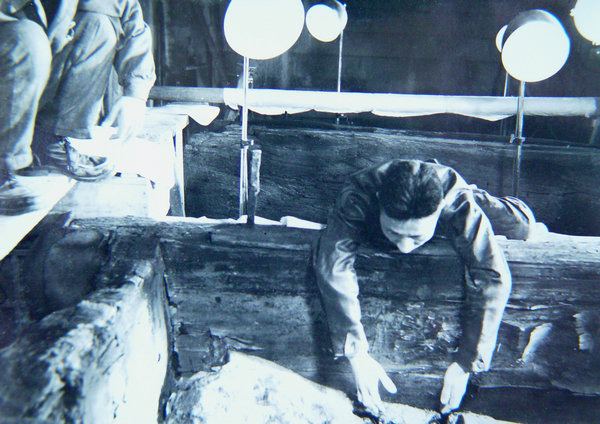 |
|
Archaeologists taking out funerary objects from a coffin at Dingling Mausoleum. [Photo provided to China Daily]
|
"The flesh on the three corpses has rotted completely, but the bones remain intact, and in all three cases the hair is soft and shiny." These words are from the first official report published by Chinese archaeologists on their excavation of the Dingling Mausoleum Beijing between 1956 and 1957.
The report, published in 1958, cited the discovery of "countless pieces of gold and jade jewelry and wares, and hundreds of fabric rolls"-a treasure big enough to cause a stir in the archaeological world beyond China, and to fuel the imagination of many who had long had an interest toward the owner of the burial ground, Emperor Wanli, the long-est-reigning emperor of the Ming Dynasty (1368-1644).
In 1572, on the death of his father, Emperor Longqing, 10-year-old Zhu Yijun ascended to the throne to become the 14th emperor of the Ming Dynasty. Wanli, his reign title, embodies the meaning of eternity, something that every ruler has wished for himself and his empire.
On the throne, the teenage emperor would grow into a young man whose craving for ultimate authority was tempered, or impeded, by the existence of an all-powerful consul, Zhang Juzheng. Acting as the de facto ruler of the country, Zhang had an aptitude for governing matched only by his political dedication. However, what he failed to gauge was the level of resentment the young emperor harbored regarding his dictatorial management style.
Zhang died in 1582, a decade into Wanli's rule. The emperor waited for two years before lashing out at the dead man and his family, confiscating all its assets. Many family members were starved to death, and Zhang's eldest son committed suicide.
Zhang himself was convicted posthumously of crimes including encroaching on royal land, intimidating fellow officials and monopolizing power, and stripped of all his honorary titles. All this even though Zhang, thanks to a series of reforms he initiated and implemented with an iron hand, had greatly increased the military might of the state and enriched royal coffers.
If Wanli harbored any illusion that Zhang's death and denouncement finally heralded the era of his free reign he would soon find out how wrong he was.

